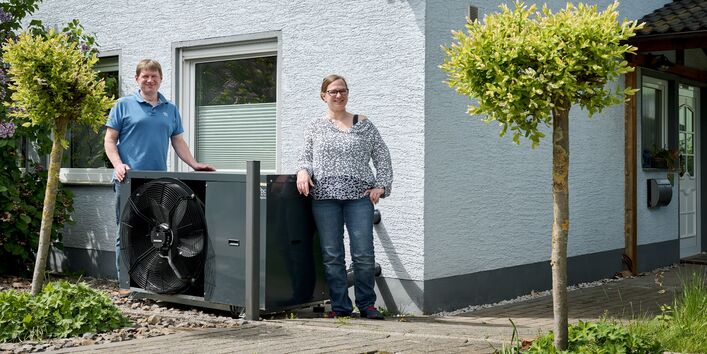Here's how heat pumps work!
Heat pumps will play a key role in the future, greenhouse gas-neutral heating of buildings. Last year, every fourth new heating system was a heat pump. Nevertheless, there are still many misconceptions and a lack of information about their potential use. The German Environment Agency (UBA) has therefore launched the internet portal “Here's how heat pumps work!” Its aim is to present successful heat pump projects and encourage others to follow suit.
“The internet portal ‘Here's how heat pumps work!’ is intended to encourage homeowners to make sustainable decisions,” explains Dirk Messner, President of the German Environment Agency. “We want to dispel reservations about heat pumps and show that they are an efficient and climate-friendly solution for heat supply – even in existing buildings. Unlike conventional boilers, heat pumps are a future-proof technology.”
The portal can be accessed at www.umweltbundesamt.de/so-gehts-mit-waermepumpen. “It not only presents technical data on buildings and heat pump solutions, but also how initial challenges can be solved,” adds Tanja Loitz, Managing Director of the non-profit consultancy co2online.
The database already contains the first projects, including the Bernd Gewiese’s heat pump systemin Straubenhardt, Baden-Württemberg. He replaced his night storage heating system, which was expensive to run, with an air-to-water heat pump in 2019. “By optimising the heat pump settings, I was able to increase the efficiency of the entire heat pump system by another 10 percent,” explains Gewiese. Thanks to the photovoltaic system that was also installed, the building's heating costs were reduced by over 80 per cent.
But this is just the beginning. The German Environment Agency is inviting homeowners, planners, energy consultants and tradespeople to use the portal and share their experiences of heat pumps. Interested parties can simply enter information about their project using an input form on the German Environment Agency's website: www.umweltbundesamt.de/so-gehts-mit-waermepumpen-mitmachen
The “Here's how heat pumps work” portal is being implemented by the German Environment Agency together with the non-profit consultancy co2online as part of a research project. They are supported by an advisory board consisting of 15 experts from the heat pump sector, including from science, industry, trade and energy and consumer advice services. The project will address further target groups and set priorities by the end of 2025. The project will also create a planning tool to help homeowners assess the suitability of their building for heat pumps.
